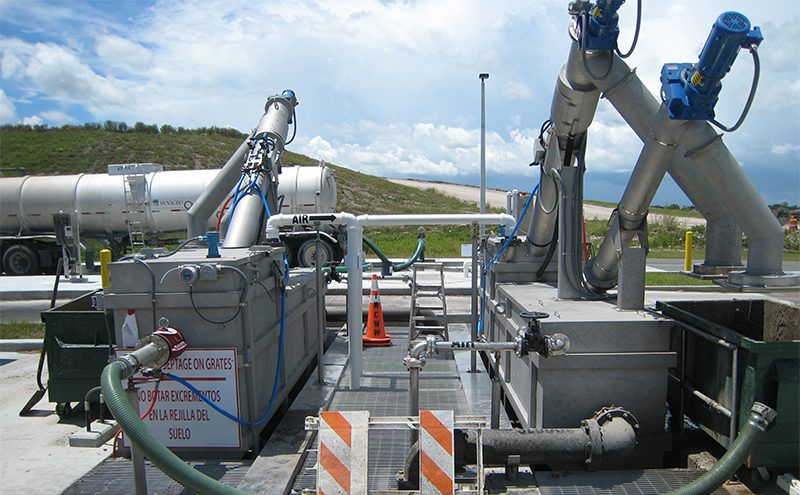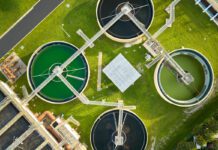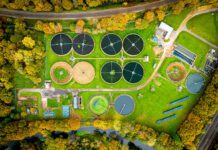With an estimated 10 percent of Florida’s two million to three million septic tank systems not working properly, there is understandable concern about pollution to pristine bodies of water such as the Indian River Lagoon on the east coast near Vero Beach. US water purification specialist Lakeside Equipment discusses challenges like grit removal and where it believes its Raptor Septage Complete Plant (SCP) has contributed a solution

With some tanks currently emptied only every fifteen years, contributing to nutrient and fecal coliform bacteria in groundwater, moves are afoot to introduce laws that would require inspection and emptying of tanks every three to five years.
In Brevard County, for example, which accounts for 71 percent of the lagoon, there are 82,000 permitted septic systems, of which according to a legislative staff analysis, 59,500 pollute groundwater that flows into the estuary. That pollution contributed to the algae blooms that killed fish in the Banana River and northern lagoon last year.
New legislation would undoubtedly see an increase in volume at treatment plants such as Indian River County’s Residuals Dewatering (Biosolids) Facility (RDF), where news had clearly travelled far and wide about its efficiency. Recent analysis showed that approximately 66% of the hauled waste brought to the site by septic haulers was not actually generated in Indian River County itself. These wastes came from commercial, industrial and municipal sources in addition to residential septic tank cleanings located in Brevard, Palm Beach, Martin, St. Lucie, and Okeechobee counties. Planned and built to serve the needs of the Indian River County community whose taxes pay for it, the RDF no longer accepts out of county haulers who previously travelled to the facility from up to 100 miles away.
Yet despite still receiving such large volumes (100,000 gallons) of septage from 30-35 vac trucks on a daily basis, Indian River’s RDF has been a tower of strength since it opened in 2010. Determined to provide a highly robust plant, the facility’s team have made an exceptionally strong case in justifying the high specification of the equipment it chose. Lowest bid didn’t win.
Specifying grit removal
“For grit removal”, explains Rich Meckes, Indian River County’s RDF Manager (who has worked at the facility since it opened), we looked at several manufacturers and visited quite a few sites, but for a system that was truly built for purpose, Lakeside’s complete plant (combining screening and grit removal) sets itself apart. There are no failure points”.
Fully automated, Lakeside’s Raptor Septage Complete Plant (SCP) is a self-contained unit with a small footprint that compacts and dewaters captured screenings to a solids content of 40 percent.
“There’s nothing flimsy on the plant”, added Meckes. “It is designed with thick stainless steel. Everything is rugged, and it is also far easier to access than others we looked at. You can open up the top cover and all the maintenance points are very conveniently located. It’s clearly designed by those who understand the application and have thought through the role of the operator”.
Indeed. The pre-engineered design reduces engineering costs and the all stainless steel construction resists corrosion. At the heart of Lakeside’s Septage Complete Plant is the Raptor Fine Screen, with rotating rake teeth that fully penetrate the cylindrical screen bars. This prevents plugging and blinding caused by grease and small debris, enabling faster unloading times to generate more revenue.
Lakeside’s SCP is also available with an Acceptance Control System (RACS) – a security access station that allows authorized haulers to unload their waste at a facility. Adding the data management and accounting system with the RACS station provides administration capabilities to track and invoice customers.
“We capture way more grit and rags than we ever anticipated”, added Meckes. “It’s incredible what it pulls out. We fill a four-yard dumpster every day – sometimes more than one per day. The Septage Plant is extremely tough and can handle pretty much everything that comes its way”.
He continued: “The conditions it operates under are crazy, but in nearly a decade, there have been no bearing failures, and we have only had to carry out very basic daily maintenance”.
Meckes explained that one of Indian River County’s mechanics simply opens the SCP up for less than an hour per day for a clean down with a hose, and perhaps for a bit of grease to be applied now and again.
“It doesn’t always need a clean”, said Meckes. “Another great thing about the machine is its overnight self-cleaning cycle. This stops the build-up in the bottom of the unit, which is very helpful. Overall, we’re very happy with it – and as a company, Lakeside have been very easy to work with. The company’s agent, Fred Trippensee (Trippensee and Company), has also been extremely helpful.
“We certainly didn’t anticipate getting 10 years of service from this combined screen and grit removal system. If you can get a decade out of any equipment on a tough application at a wastewater treatment plant, without any major problems, you know you’ve bought right. Considering the abuse that the Lakeside Septage Complete Plant has taken, it has been a great buy. It shows no sign of stopping”.








